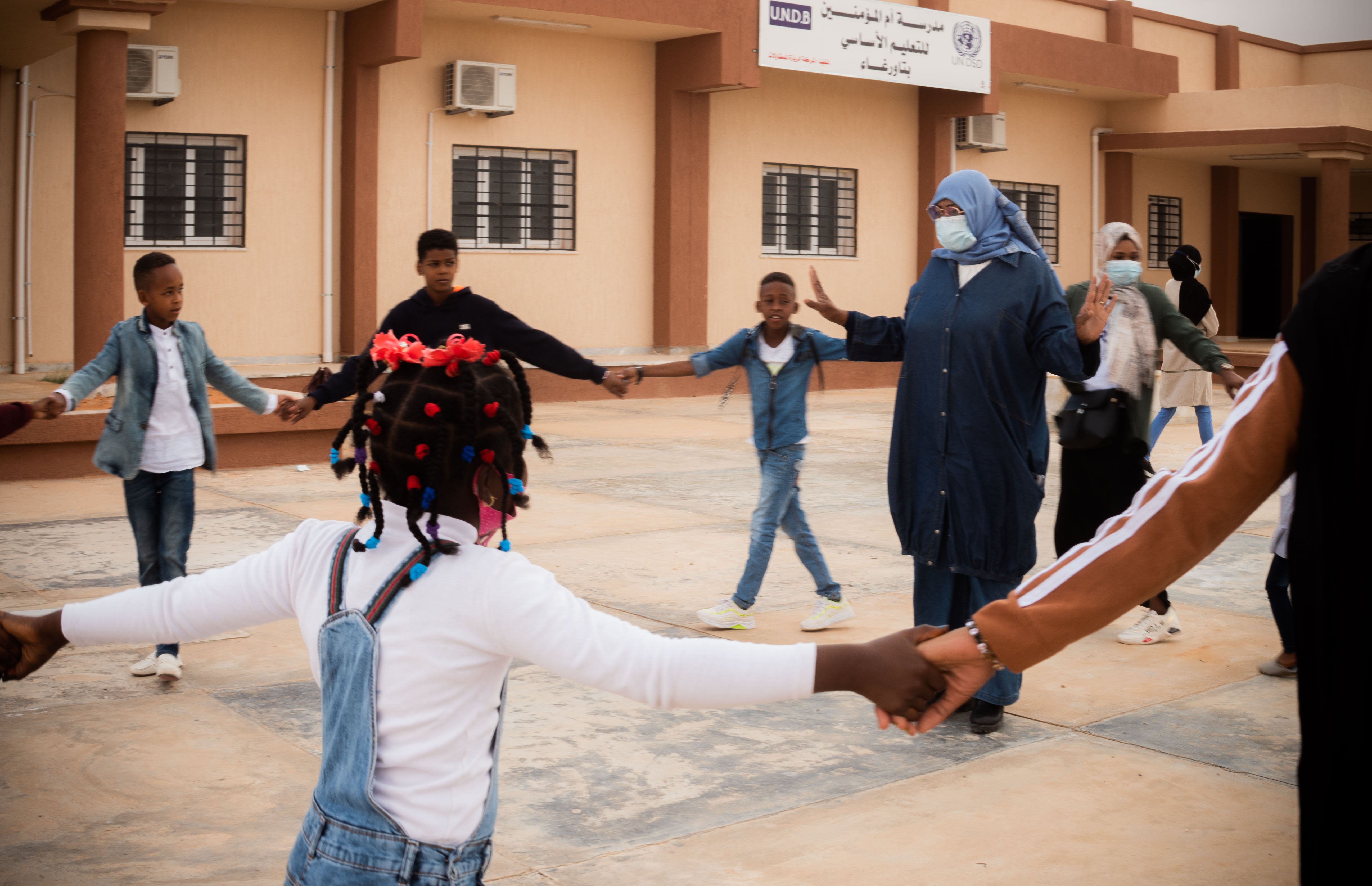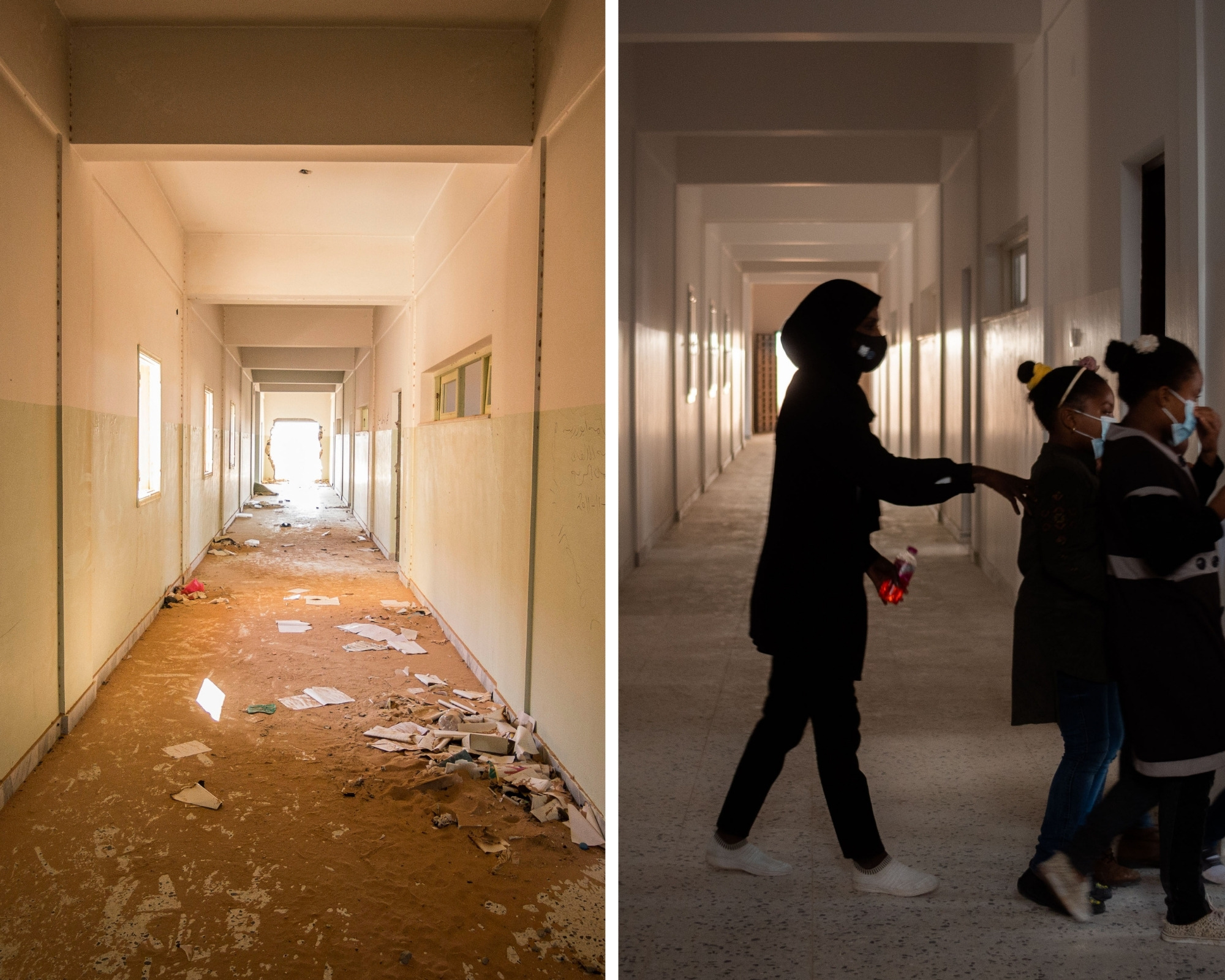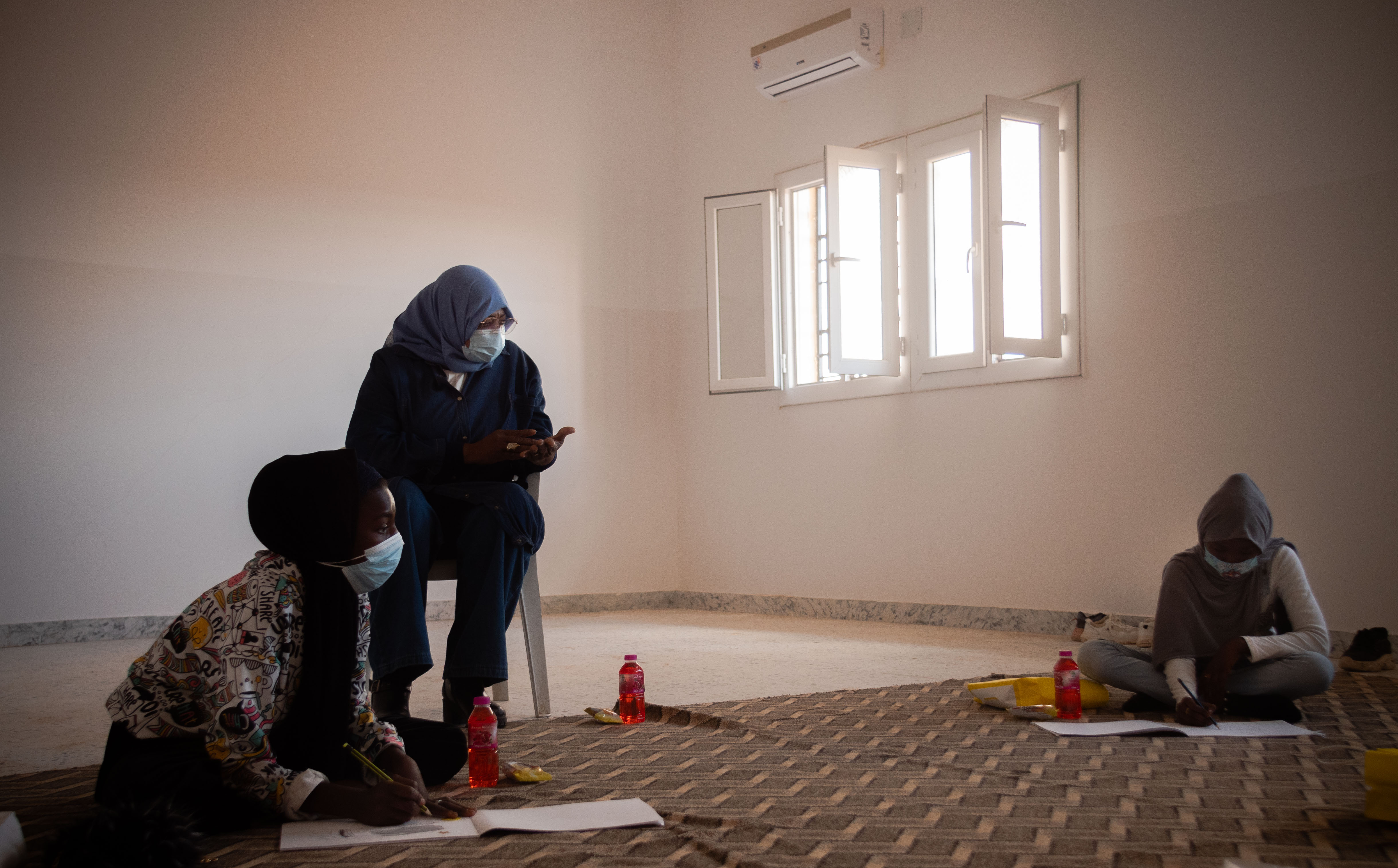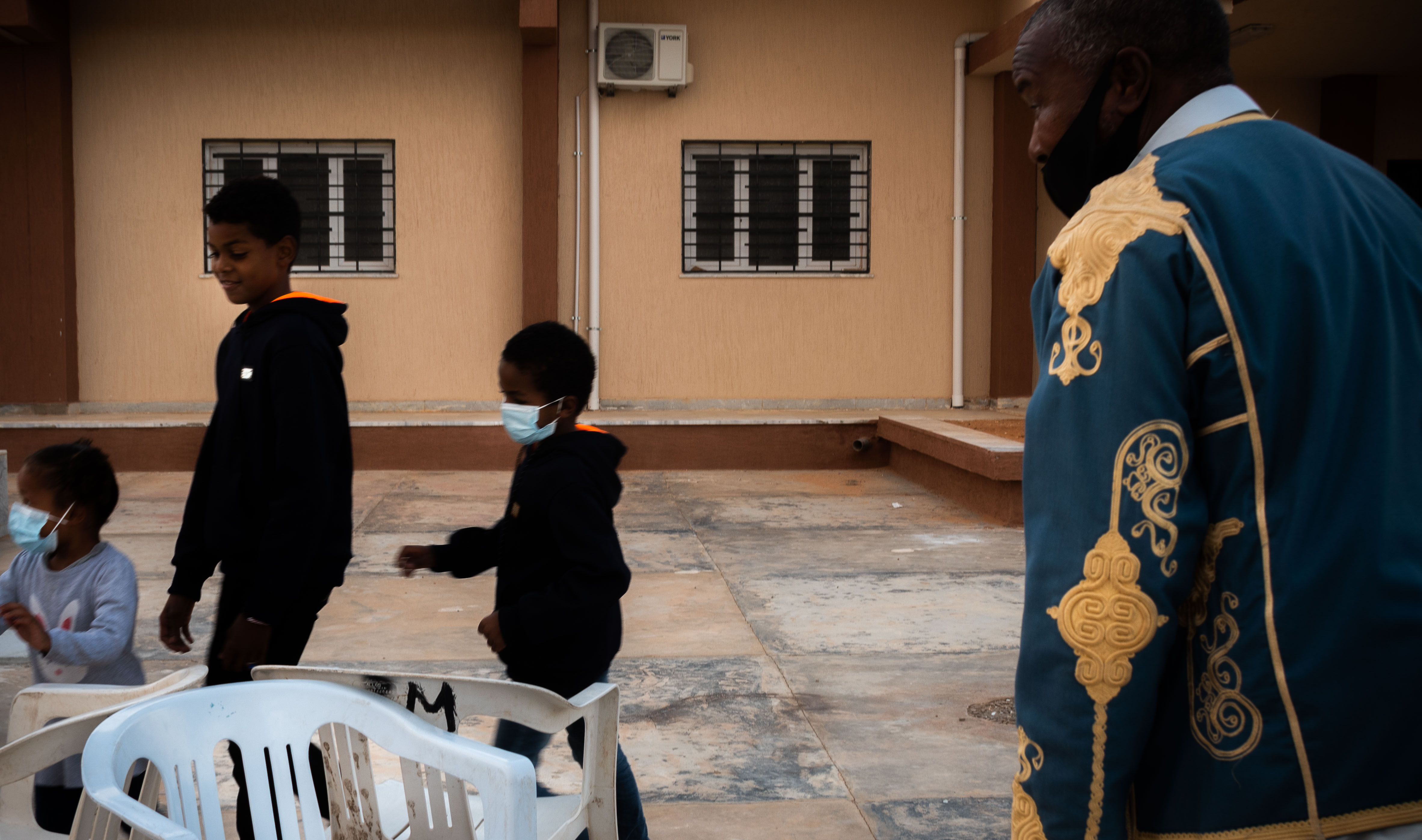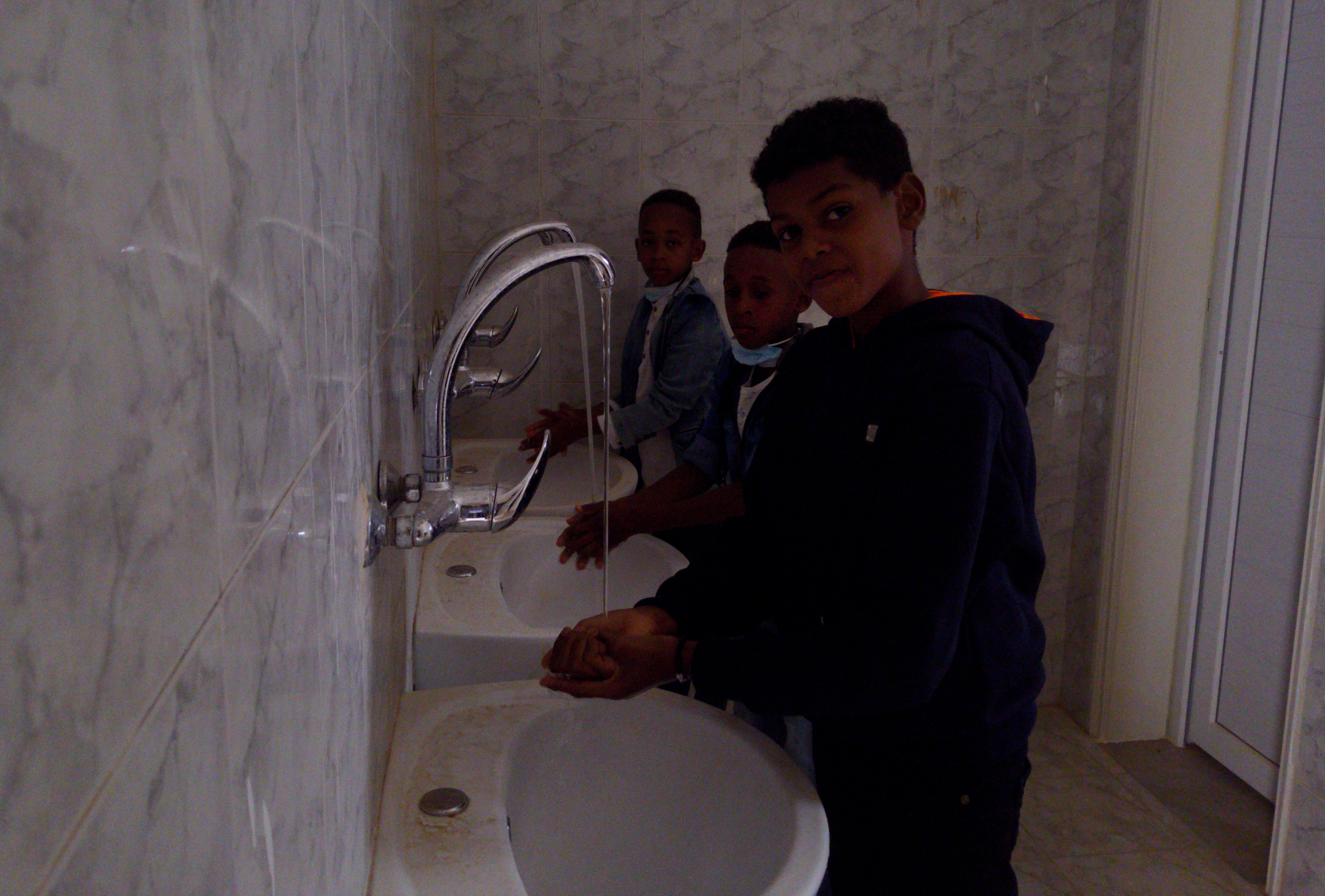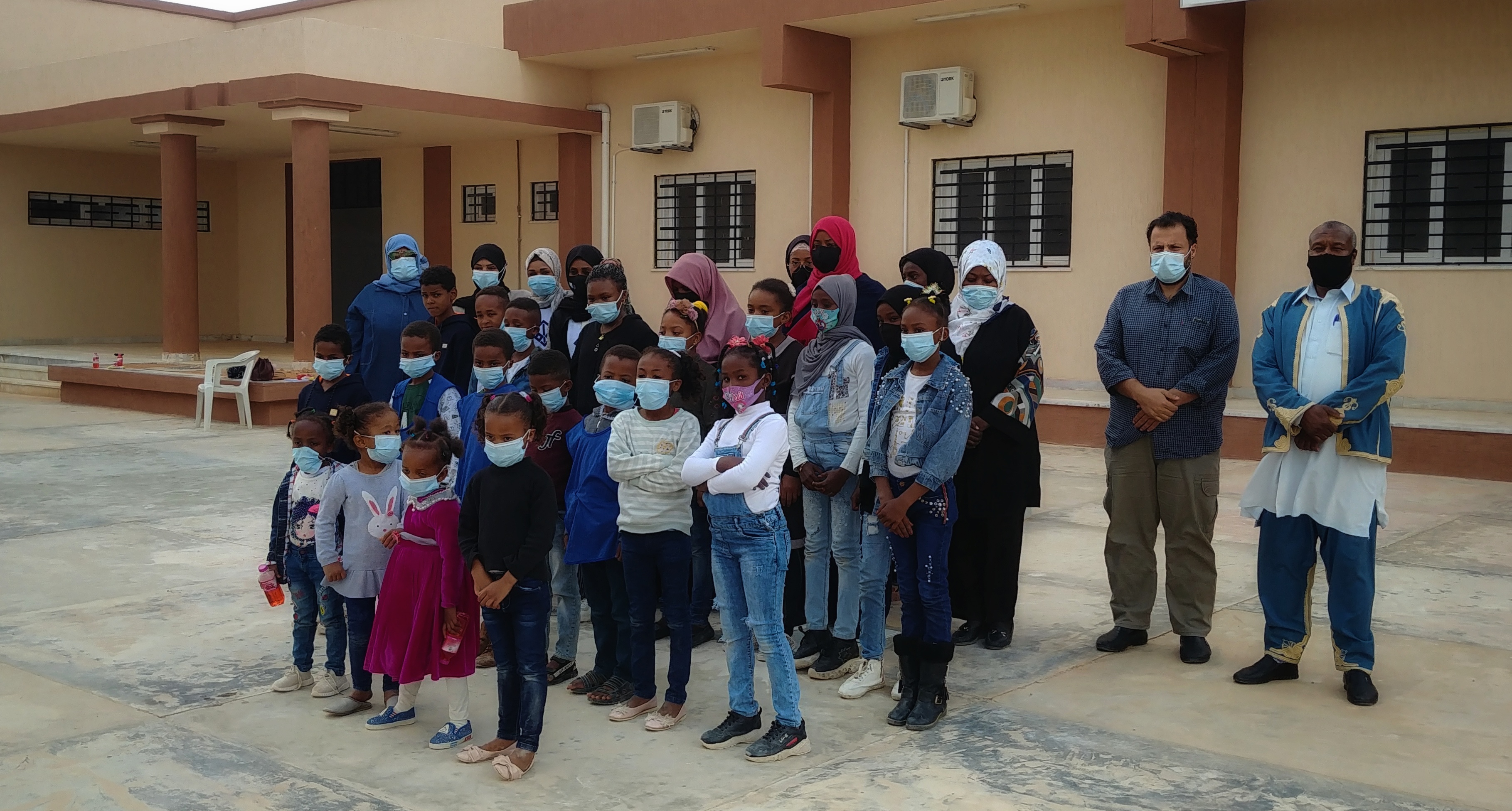Ms. Salima Khamis (in the middle) with children during entertainment activities at Um Al Moamineen School in Tawergha. Photo: ©UNDP Libya/Malek Elmaghrebi
“More than 500 families have returned to Tawergha after renovation of three schools in the city in September 2020," said Mr. Mr. Abd al-Rahman Shakshak, Head of Tawergha Local Council.
In 2011, during the conflict that Libya experienced, 40,000 Tawergha residents were forced to leave their homes becoming displaced for over seven years. Thanks to the Reconciliation agreement between Misrata and Tawergha in 2018 facilitated by the United Nations Support Mission in Libya (UNSMIL) with the support of the United Nations Development Programme (UNDP), people from Tawergha began to return progressively to their homes safely and settle again.
"My team and I used to present our programs and games to children during the most challenging circumstances. Despite challenges, we were all keen to continue providing these programs due to their importance in resettling people, especially children," said Ms. Salima Khamis, sport supervisor in the Education sector of Tawergha local council, married and mother of two children.
"When reconciliation between Tawergha and Misrata was announced, we were very pleased with this news, which we had waited for a long time. Therefore, I decided to return and settle again in my beloved neighborhood in Tawergha," Salima stated.
Returnees found a ghost city with no functioning basic services. It was very difficult for people to adapt to the situation and the challenge of stabilizing the area became the responsibility of the local council.
''When we returned to the city to start working, there were no places to use, in terms of housing, healthcare or education. At the beginning, we prepared a school and a mosque as housing for families. After that, we used the prefabricated buildings [ provided by the Ministry of Education] to have a school and health center. We had to do something to help the people settle again in the area," declared Mr. Shakshak.
One of the classrooms at Um-Al Moamineen School before and after renovation. Photo: ©UNDP Libya
Socialization through games for children in Tawergha
Sport games and other entertainment activities are essential to ensure physical and mental well- being of children. Ms. Salima Khamis and her team are not only running these programs during the school period, but also trying to maintain them even on vacations and during breaks.
"The games that we provide to children are not only for entertainment, but also to cover other dimensions. For example, we can understand and analyze the personality of a child and act when one is going through psychological disturbance. Furthermore, the games allow children to socialize and make new friends," Salima said.
The team faced some challenges until recently trying to find suitable and safe places in the city for entertaining children.
"At the beginning, I used to offer these programs to children in the camp in which we previously resided, and when the prefabricated classrooms were prepared, we provided our entertainment and sports programs there," she explained.
Schools renovated, hope for a better future
With the progressive return of residents to their home city, the local council was in an urgent need to provide basic services and contribute to the stability of Tawergha. The United Nations Development Programme (UNDP) responded to the requests of local authorities and initiated some interventions.
Led by national and local institutions and implemented by UNDP with support from 13 international partners and the Government of Libya through the Ministry of Planning, the Stabilization Facility for Libya (SFL) completed renovation of three educational institutions: Um Al Moamineen School , which accommodates 250 students in "primary and intermediate", Shohada Tawergha School , which has the capacity to host 200 students in "primary and intermediate" and Ittihad Ifriki School for 150 students in "elementary and preparatory".
In times of Covid-19 pandemic, schools were closed for a long period as a preventive measure, but Salima and her team took advantage of the newly renovated buildings to conduct some entertainment activities.
Ms. Salima Khamis and students during entertainment sessions inside one classroom at Um Al Moamineen School after renovation (November 2020). Photo: ©UNDP Libya/Malek Elmaghrebi
"The schools are ready to accommodate students as soon as furniture is in place. New doors and windows have been installed in all schools in addition to repairing toilets and painting all the walls," declared Mr. Saleh Shaybah from the Education Sector of Tawergha Local Council.
"The summer season in Tawergha is very hot which makes it hard for the students to concentrate, so cooling devices have been installed in all schools," he added.
After completing primary and secondary levels, students will need to go to universities. Parents and educators would prefer to have university facilities locally. This will avoid long distances for students and additional financial costs for parents.
"Since the old college is not rehabilitated yet, the University of Misrata offered to open a branch in the region. So students will be able to complete their higher and university studies in Shohada Tawergha School rehabilitated by UNDP’s Stabilization Facility for Libya," he explained.
Mr. Saleh Shaybah is supervising a game at Um Al Moamineen School in Tawergha. ©UNDP Libya/Malek Elmaghrebi
"The renovation works look very good and they were done within the stipulated time. Certainly, adding these facilities to the education sector in the city will help to receive more students, as there are now 700 students registered [November 2020] and we expect the number to increase in the next season along with the return of families to Tawergha," explained Abd al-Rahman Shakshak.
Children are washing their hands after games at Um Al-Moamineen School in Tawergha. Photo: ©UNDP Libya/Malek Elmaghrebi
More stability, more returnees in Tawergha
The rehabilitation of the three educational centers, which were severely damaged, is bringing hope to the community. An increasing number of those who were still unsure about returning home have now decided to do so as the availability of schools is a strong incentive.
"Since we returned, I always feel that my son belongs to the city in which we used to live because he was born here and has a lot of friends. I think his start here was difficult because there were not many children to play with," stated Ms. Umm Abdel Salam, resident of Tawergha. "Finally, we have decent schools like in other regions and cities. Now I can send my son to school and make sure that he learns in an appropriate and safe environment, " she added.
“All the projects and initiatives undertaken by UNDP in Libya are helping us very much in restoring the stability of the city, and thus this will contribute to motivating the rest of the families to return and settle again in the Tawergha,” stated Abd al-Rahman Shakshak, Head of Tawergha Local Council. “We thank all who contributed to making this possible, especially the SFL," he added.
Through the Stabilization Facility, UNDP provided an ambulance, rehabilitated three schools as well as a computer lab with capacity for 24 trainees to learn new skills.
The SFL has also facilitated the organization of a series of workshops that have allowed many Tawerghans to receive psycho-social support.
"About one third of the 50,000 former residents of Tawergha have already returned to Tawergha since 2018, " declared Abd al-Rahman Shakshak.
"Today, there is an appropriate environment that helps effectively in our activities with children, especially outdoor activities. Having a private space far away from noise helps a lot", Salima concluded.
A group photo of students, the team in charge of sport and entertainment and the SFL Coordinator in Tawergha at Um al Moamineen School. Photo: ©UNDP Libya/Malek Elmaghrebi

 Locations
Locations